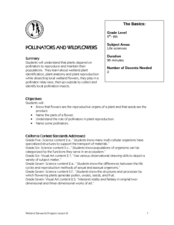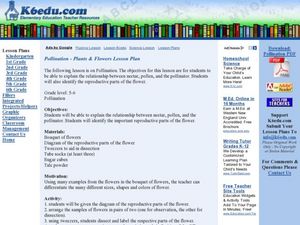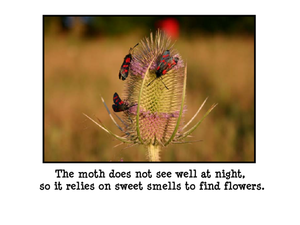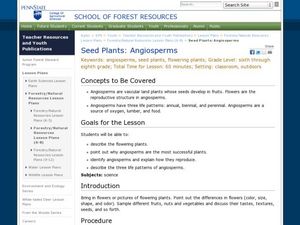Curated OER
Pollination Power
Students go out into the garden and observe pollinating animals through hand lenses. In this pollination lesson plan, students also discuss how animals carry seeds to create new plants elsewhere.
National Wildlife Federation
Pollinator's Journey: Grades 5-8
Re-enact the flight of the pollinator. Pupils learn about the roles of butterflies, bats, and other pollinators in plant reproduction. The class acts out the migratory flight of Monarch butterflies and bats from the Sonoran Desert to...
National Wildlife Federation
The Pollinator's Journey: Grades K-8
Bees get all the attention, but so many more creatures contribute to pollination. Scientists explore the role of pollinators as they learn about the parts of a flower and how it reproduces. They discover how plants rely on many different...
Curated OER
Plants and Animals: Partners in Pollination
Students describe the complementary relationships between pollinators and the plants they pollinate, identify adaptations that flowers have developed to "encourage" pollination, and create and draw their own "designer" flowers.
Curated OER
Plants and Animals, Partners in Pollination
Students participate in multiple hands-on activities to explore reproduction and pollination. In groups, using a cotton swab and powder, students simulate being pollinators and plants. They name the parts of the flowers and the function...
Curated OER
Green Plants
Beginning botanists are introduced to the world of plants with this PowerPoint. Some of the information is most appropriate for primary learners, such as the needs of a plant. Some of the information, however, is more directed at...
Curated OER
Who Wants to be a Millionaire? Human Body Systems and Plants
Fifteen multiple choice questions review a variety of biology topics. In game-show fashion, viewers answer questions about a plant's needs, the skeletal system, and the cardiovascular system. If you happen to teach these three topics...
Curated OER
Pollination of Flowers by Moths
Turn your classroom into a pollination station as your kids transform into moths or predators trying to survive and aiding in plant reproduction along the way. Using silent party blowers as proboscises, the moths will have two minutes to...
Rural Science Education Program
Bees and Flowers – Partners in Pollination
Why are bees so important? After several activities where kids investigate the form and function of flowers, they learn about the different types of bees and label them. They then examine pollen under a microscope and decide which bees...
Curated OER
Pollination Parties
Students discuss the pollination of bees and butterflies. In this pollination lesson,students complete a worksheet answering questions about an imaginary bee pollination company. Students understand the relationship...
Scholastic
Study Jams! Flowers
RJ hangs out in Zoe's garden as she explains pollination, flower anatomy, and fertilization. This cartoon-styled feature is sure to stay in your botanists' minds! Follow it with the dissection of large flowers, such as the lily.
Curated OER
Plant Pollination
Students investigate methods of pollination for various flowers. In this plant biology lesson, students learn the parts of a flower and form a hypothesis about the method of pollination for the flower. They determine the validity of...
Curated OER
Pollination Parties!
Students conduct research on a specified plant and how it is pollinated. In this pollination instructional activity, students discover how bees pollinate plants and make life better for humans. After completing research,...
Garden Earth Naturalist Club
Parts of a Flower! Flower Dissection
Sometimes the best way to learn about plants is to see the different parts of a plant yourself. Groups of learners dissect flowers to answer questions about what they observe and what they wonder about their flower.
Curated OER
Pollinators and Wildflowers
Learners explore how plants depend on pollinators to reproduce. In this pollination lesson plan students dissect a local flower and collect and identify pollinating insects.
Curated OER
Land Plants and Algae
Students compare and contrast algae and land plants. In this plant lesson plan students discover what algae and land plants require for growth. The students discuss experimental design. The students experiment with different treatments...
Curated OER
Bees
Students design an experiment. In this bees lesson, students research pollination and work collaboratively to discover how bees aid in pollination. Students use tomato plants and create experimental designs. Lesson adaptations...
Curated OER
Pollination
Students investigate pollination. In this plant biology lesson, students study a diagram of the reproductive parts of the flower and dissect and identify the parts of a real flower.
Curated OER
Pollination-Plants and Flowers Lesson Plan
Learners study the reproductive parts and pollination for a flower. In this pollination lesson plan, students dissect flowers to perform an investigation. Learners also use tube socks to show how pollination works. A diagram is included.
Curated OER
Pollinator Habitats
Students read and discuss background information included with this lesson. They brainstorm the best sources for developing a list of native or migratory pollinators. Students work in groups to design habitats based on information...
Curated OER
Smarty Plants
Students examine plants and pollinators. In this plant biology lesson, students read The Power of Pollinators and identify the parts of the plant and the pollinators. Students design their own imaginary plants.
Curated OER
Seed Plants: Angiosperms
Students describe flowering plants and see why angiosperms are the most successful plants. In this angiosperms lesson students identify angiosperms and explain how they reproduce.
Curated OER
The Great Pollinators
Students discover the reproductive parts of a plant. In this biology lesson, students identify and categorize several different plants they dissect in class. Students record their information using a data chart.
Museum of Science
Egg Carton Nursery
Observe nature in action. Young biologists make plant nurseries from cardboard egg cartons. Once the seeds sprout, they move the flowering plants outside and make observations of bees that pollinate the flowers.

























